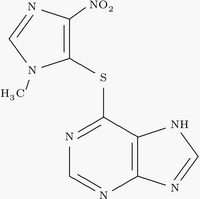Azahexal
Azathioprine is a chemotherapy drug, now rarely used for chemotherapy but more for immunosuppression in organ transplantation and autoimmune disease such as rheumatoid arthritis or inflammatory bowel disease or Crohn's disease. It is a pro-drug, converted in the body to the active metabolite 6-mercaptopurine. more...
Azathioprine was first introduced into clinical practice by Sir Roy Calne, the British pioneer in transplantation. Following the work done by Sir Peter Medawar in discovering the immunological basis of rejection of transplanted tissues and organs, Calne introduced 6-mercaptopurine as an experimental immunosuppressant for kidney transplants. When azathioprine was discovered, he then introduced it as a less toxic replacement for 6-mercaptopurine. For many years, dual therapy with azathioprine and steroids was the standard anti-rejection regime, until cyclosporine was introduced into clinical practice (also by Calne) in 1978.
Azathioprine acts to inhibit purine synthesis necessary for the proliferation of cells, especially leukocytes and lymphocytes. It is a safe and effective drug used alone in certain autoimmune diseases, or in combination with other immunosuppressants in organ transplantation. Its most severe side effect is bone marrow suppression, and it should not be given in conjunction with purine analogues such as allopurinol. The enzyme thiopurine S-methyltransferase (TPMT) deactivates 6-mercaptopurine. Genetic polymorphisms of TPMT can lead to excessive drug toxicity, thus assay of serum TPMT may be useful to prevent this complication.
Mycophenolate mofetil is increasingly being used in place of azathioprine in organ transplantation, but azathioprine certainly still has a major role.
Mycophenolate mofetil (MMF): seven RCTs compared MMF to azathioprine (AZA). MMF reduced the incidence of acute rejection. There was no significant difference in patient survival or graft loss at 1-year or 3-year follow-up. There appeared to be differences in the side-effect profiles of MMF and AZA. No RCTs comparing MMF with azathioprine were identified. Woodroffe R, Yao GL, Meads C, Bayliss S, Ready A, Raftery J, et al. Clinical and cost-effectiveness of newer immunosuppressive regimens in renal transplantation: a systematic review and modelling study. Health Technol Assess 2005;9(21).
Reference
- Konstantopoulou M, Belgi A, Griffiths KD, Seale JR, Macfarlane AW. Azathioprine-induced pancytopenia in a patient with pompholyx and deficiency of erythrocyte thiopurine methyltransferase. BMJ 2005;330:350-1. PMID 15705694.
Read more at Wikipedia.org



